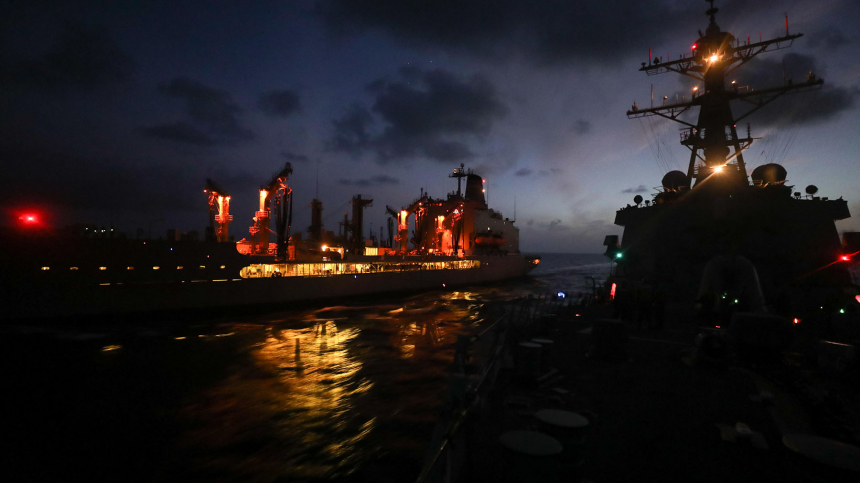Tensions Escalate in the Red Sea as Houthi Rebels Target International Shipping
Maritime security has deteriorated in the Red Sea due to recent attacks on international shipping by Houthi rebels, raising global concerns.
Published May 01, 2024 - 00:05am

Image recovered from 5-tv.ru
In a series of maritime security incidents that have ratcheted up tensions in a crucial international shipping route, Houthi rebels from Yemen have intensified their attacks on merchant vessels in the Red Sea. The rebels' campaign has targeted several ships, including American destroyers, a British tanker, and various commercial vessels linked by trade to Israel. The Houthi faction claims this is an act of solidarity with Palestinians and an effort to pressure Israel to end its actions in Gaza.
Specific incidents detailed by maritime security agencies include the targeting of the Greek merchant vessel MV Cyclades flying the Maltese flag, a container ship CMA CGM Manta Ray, and the American destroyers USS Philippine Sea and USS Laboon. Despite the Houthi claims of not hindering maritime freedom and not targeting other countries' ships, the attacks have heightened the risk for international trade and shipping operations in the region.
The Houthi group, known for being backed by Iran, has reportedly launched over 50 attacks against shipping lanes since November. These have prompted retaliatory strikes led by the United States and have raised the prospect of a larger-scale international response.
The US Central Command (CENTCOM) has been actively engaged in intercepting threats, shooting down a Houthi unmanned aerial vehicle (UAV) above the Red Sea that was deemed to pose 'an imminent threat' to US, coalition, and commercial vessels. Despite no injuries or damages reported, the repeated attacks have significantly compromised maritime security and continue to threaten safe navigation in the region.
The strategic location of the Red Sea as a conduit for much of the world's maritime commerce makes the repercussions of such security threats a matter of international concern. The latest surge in Houthi aggression underscores the volatility of the region which serves as the gateway for European-Asian trade, including oil shipments through the Suez Canal. This escalation comes amid a complex backdrop of regional conflict and rivalries, with the Houthis drawing support from Iran, a nation that frequently finds itself at odds with US interests and its allies in the region, including Saudi Arabia and Israel.
The maritime incidents have led to international calls for heightened security measures and the free navigation of vessels in accordance with international law. Shipping companies have been advised to be vigilant and consider rerouting as analysts warn that the Red Sea might become a flashpoint for further geopolitical strife. Moreover, insurance costs for vessels operating in the region have surged, and some shipping lines are contemplating the avoidance of the Suez Canal route altogether if attacks persist.
Global trade networks could face major disruptions if hostilities continue to affect the Red Sea route. The Houthi impetus in creating these disturbances can be understood within the larger framework of the protracted Yemeni conflict, which has been exacerbated by foreign interventions and has led to one of the worst humanitarian crises in the world. Despite international efforts, a long-term political solution has remained elusive, leading to continuous instability that periodically spills into the maritime domain.
Analysts believe that the Houthi faction's recent targeting of maritime interests is a calculated attempt to expand the Yemen conflict’s footprint, generate international attention, and gain leverage in any future negotiations over the war in Yemen. This tactic is also seen as an extension of the 'war of attrition' that the Houthis and their backers have engaged in against the Saudi-led coalition and its allies. The attacks on shipping are a manifestation of the asymmetrical warfare the Houthis have resorted to in face of the vast conventional military superiority of their adversaries.
The United States, along with its allies, has emphasized its commitment to defend freedom of navigation and international norms. While the US and other nations have called for restraint and dialogue, their military assets in the region are on high alert, and the US Navy has bolstered its presence in response to the Houthi UAV actions. This display of naval power serves as a deterrent, but also reflects the complexities of power projection in destabilized regions where non-state actors wield significant influence.
The United Kingdom and international maritime organizations are closely monitoring the situation and emphasize the importance of diplomatic channels to resolve the crisis. Meanwhile, the United Nations has appealed for an immediate cessation of attacks on civilian shipping, highlighting the potential for miscalculation that could lead to an open conflict with repercussions far beyond the Red Sea.
In conclusion, the international community is confronted with the key challenge of maintaining the delicate balance of ensuring maritime security while navigating the geopolitical intricacies of the Yemeni conflict. As tensions show no immediate signs of abating, the imperative to protect the critical shipping lanes in the Red Sea has become ever more apparent. It remains to be seen how the convoluted dynamics of regional politics will impact the efforts to bring stability to the pivotal maritime gateway between the East and West.







